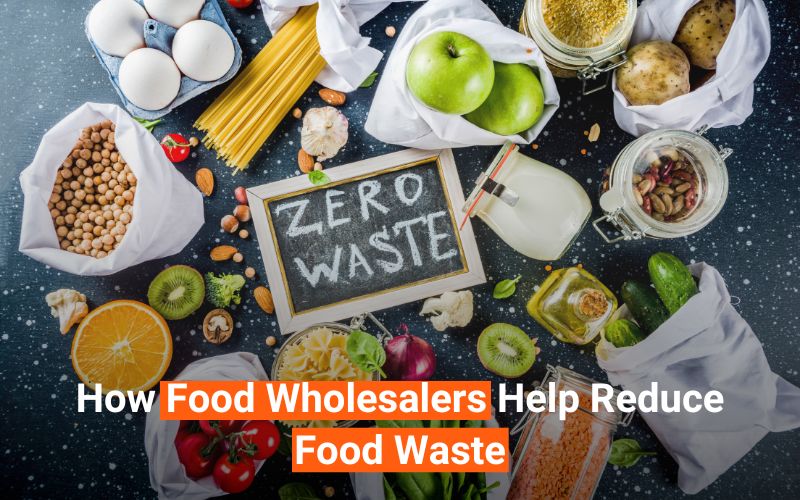Food waste is a major problem worldwide, with up to 2.5 billion tonnes of food being wasted yearly worldwide, according to a study by the World Wildlife Fund and Tesco. This is a significant economic and environmental issue and a social one, as millions of people go hungry while perfectly good food is discarded. Fortunately, food wholesalers can play a significant role in reducing food waste. By purchasing and distributing imperfect produce, reducing overstock and inventory waste, donating excess food to food banks and charities, and providing education and resources to customers on reducing waste, food wholesalers can significantly impact the fight against food waste. In this blog post, we will explore how food wholesalers help reduce food waste, provide case studies and examples of successful waste reduction, and discuss the impact of food wholesalers on the environment and society.
How food wholesalers can help reduce food waste
Food wholesalers have a significant role to play in reducing food waste. Here are some ways that food wholesalers can help:
1. Purchasing and distributing imperfect produce
Many farmers and suppliers discard produce that does not meet strict aesthetic standards, even if it is still perfectly edible. Food wholesalers can help reduce this type of waste by purchasing and distributing imperfect produce to customers who are willing to accept it. This can be a win-win situation, as customers can often get this product at a lower cost while the wholesaler helps to reduce food waste.
2. Reducing overstock and inventory waste
Food wholesalers often deal with large quantities of perishable items with a limited shelf life. Overstocking and inventory mismanagement can result in food waste when items expire or become unsellable. By carefully managing inventory and reducing overstocking, wholesalers can help reduce the amount of food that goes to waste.
3. Donating excess food to food banks and charities
Despite best efforts to manage inventory, food wholesalers may still have excess food that cannot be sold. Rather than disposing of this food, wholesalers can work with local food banks and charities to donate it to those in need. This not only helps to reduce food waste but also benefits the community.
4. Providing education and resources to customers
Food wholesalers can help reduce food waste by educating their customers on best practices for reducing waste. This can include providing tips on storing, handling, and preparing food and offering resources such as recipes that use leftover ingredients. By helping customers reduce waste, wholesalers can indirectly reduce waste throughout the entire supply chain.
Case studies/examples.
Here are some examples of food wholesalers successfully reducing food waste:
1. Baldor Specialty Foods
Baldor Specialty Foods is a food wholesaler based in the North-eastern United States that has taken several steps to reduce food waste. One initiative is the company’s “Imperfect Produce” program, which offers customers the option to purchase misshapen or slightly imperfect produce at a reduced price. The company has also implemented a food waste tracking system to monitor waste and identify areas for improvement.
2. Sysco
Sysco is a global food wholesaler that aims to reduce food waste by 50% by 2025. To achieve this goal, the company has implemented many initiatives, including a “Good Returns” program that enables customers to return unused or unsellable products for credit, which Sysco can donate to local food banks and charities.
3. Chef’s Warehouse
Chef’s Warehouse is a speciality food wholesaler that has implemented several waste reduction strategies, including partnering with local farmers to purchase and distribute “ugly” produce and using a composting program to divert food waste from landfills. The company also offers educational resources and training to customers on reducing food waste.
4. Spudshed
Spudshed is a family-owned food wholesaler in Western Australia that has implemented some initiatives to reduce food waste, including a “No Waste” program that encourages customers to purchase “ugly” produce and a composting program to divert food waste from landfills. The company also works with local food banks to donate excess food.
These examples demonstrate the variety of strategies that food wholesalers can use to reduce food waste, including offering imperfect produce, implementing food waste tracking systems, donating excess food to local charities, and providing education and training to customers.
The impact of food wholesalers on reducing food waste
Food wholesalers have a significant impact on reducing food waste. By adopting waste reduction strategies and implementing best practices, food wholesalers can reduce the amount of food that is discarded and diverted to landfills. Here are some of the ways that food wholesalers can impact reducing food waste:
1. Economic Impact
Food waste is a significant economic issue, costing billions of dollars yearly. By reducing waste, Food Wholesalers can save money on inventory costs and increase profits by selling previously discarded products. This can also result in cost savings for customers, who can purchase products at a lower cost.
2. Environmental Impact
Food waste has a significant environmental impact, contributing to greenhouse gas emissions and other environmental problems. By reducing waste, food wholesalers can help to reduce their carbon footprint and protect the environment. For example, diverting food waste from landfills can reduce methane emissions, a potent greenhouse gas.
3. Social Impact
Food waste has a social impact, as millions of people go hungry while perfectly good food is discarded. By donating excess food to local charities and food banks, food wholesalers can help to alleviate hunger and support their local communities.
4. Industry Impact
By adopting waste reduction strategies and best practices, food wholesalers can set an example for others in the industry and encourage the widespread adoption of waste reduction practices. This can create a waste reduction culture throughout the entire food supply chain.
Read More: Best Jams Brands to Stock at Your Retail Store in UK
Conclusion
Food wholesalers have a significant impact on reducing food waste. By implementing strategies to reduce waste, such as purchasing and distributing imperfect produce, reducing overstock and inventory waste, donating excess food to local charities, and providing education and resources to customers on reducing waste, food wholesalers can positively impact the environment, society, and industry.





